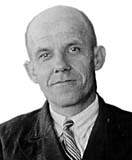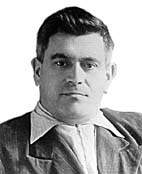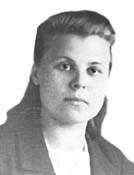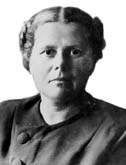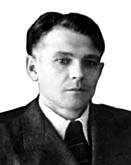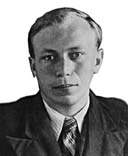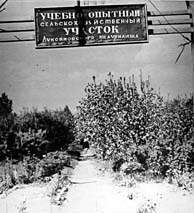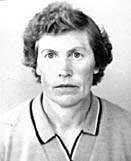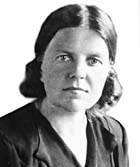

|

|

|

|

|

|

|
Pedagogical school during 40-50s
After the War Lukoyanov pedagogical school as well as the whole country had a very difficult time because of the loses and ruins of the wartime.
In 1945 the school's buildings acted as hospitals during the wartime were returned and, moreover, the building of the school ╣1 located on the Peace Square was moved to the pedagogical school, too. There was no money to reconstruct the buildings, so they had to do it with their own forces. But the interior of the studies was very awful (ragged walls, furniture elected by chance). In winter, the buildings were heated by wet firewood, so the atmosphere in the classrooms was not only cold but waste, too. Students were often taken for the preparation of the firewood. The receiving into the school was the same as in the wartime so the number of students was not so high.
In Autumn of 1945 A.A.Kumanev retired from the Army and stayed at the head of the school again. He had not only to fix the material funds of the school but to form almost a new pedagogical staff. Pre-war staff was not practically existed. F.A.Kargayev and S.I.Zhukovsky were killed on the front. K.I.Mansurov and G.L.Andronov didn't returned to the school. N.D.Andronova and S.P.Radayeva moved from Lukoyanov. G.S.Yermushkin became a communist party worker. D.A.Taskin died in 1947 and his wife K.P.Taskina retired. Among the former (pre-war) teachers were only 6 people. But that was enough for saving the spirit of creating, kindness and co-operative work which reigned at pre-war years.
They who returned from the front are a teacher of the Pedagogical training F.I.Volkov, and a teacher of Art A.R.Ousanov. In 1946 F.I.Volkov was appointed a head of studies. The one very important fact in forming of the new pedagogical staff was that for the first time the teachers were the graduators of the school. They were former soldiers V.L.Parshin - a teacher of Mathematics, K.P.Dobrotvorsky - a teacher of Music, A.I.Vasilyev - a teacher of the Pedagogical training and Psychology. Other former front-line soldiers began to work there too: N.A.Budaragin - a teacher of Mathematics, B.V.Martyanov - a teacher of Music and I.F.Mironov - a teacher of Geography. Some experienced teachers from other schools of the town moved to work to the school: V.P.Kumaneva - a teacher of Russian Language and Literature, A.M.Zhuravleva - a teacher of History. Finally there formed a good staff of teachers, consisting of experienced and young teachers, very conscientious, educated, deeply devoted to their job, and very different in their hobbies.
The life and soul of the staff and the generator of many ideas, the author of a lot of initiatives was the director A.A.Kumanev. He was a kind of directors who clear understood all the responsibilities for the mission affairs. To teach teachers means to be the teacher himself twice. He understood the specialty of the profession of the teacher. Human and professional features are indivisible in it. " It is impossible being a good teachers while being a bad person", - he often repeated. He himself was the example of this unity. His wide erudition, keenness on his job and love to people, aspiration to share his knowledge with other people and help anybody who needs it were the things, which attracted other people. He was a subtle psychologist, a very interesting talker, and the man of crystal honesty who never gave causes anybody to suspect in his decency. He succeeded to create the atmosphere of total involvement into the affairs of the school.
The main task of teaching was the preparation of a teacher, who knew and could do a lot of different things, who could think creatively and with zeal, who could overcome all the difficulties, and what is more important, who was fond of children. It was not very easy to decide this problem inside a small provincial school. Graduators of the village schools came there. Theoretical level of their education and general level of their development, their mental outlook and range of interests were limited. It was necessary to change their attitude to the knowledge and to make their range of interests much wider. It was necessary not only to learn them knowledge but to change their psychology.
During the first years after the war A.A.Kumanev was a staunch supporter of the pedagogical ideas of A.S.Makarenko. Pedagogical staff of the school took up the Makarenko's principles of the parallel interaction and the systems of perspective lines. In practical work it was reflected in creating of a friendly atmosphere of cooperative interaction between teachers and students. Most of the teachers of the school had deep knowledge, were very enthusiastic and devoted to their job. They had always been side by side with the students. That is why some years later they remind them in their letters and on the meetings with deep gratitude: their names are M.A.Vinokurova, A.M.Zhuravleva, Z.I. Korobova, I.F.Mironov, A.N.Nazarova, V.L.Parshin, A.R.Ousanova and many others.
I am happy and proud of having met with this remarkable collective of intelligent, thinking, and keen on their job teachers. Thank you! It is small. We make a profound bow to you and tell you the most sincere and hearty words of gratitude. You are our leading lights, we compare our lifestyles with you", wrote in her letter a 1952 year graduator A.Nosova. Many kind words were said about those days teachers. Some more words about some of them:
A.R.Ousanov was an artist. He began his work at school before the war, in 1936. After the war his untiring hands practically changed the decoration of the school in a very short time. One could see beautifully-made portraits of the writers, musicians, scientists and stands on the corridor walls. Skillfully decorated stage made the meeting hall comfortable and smart. Alexei Romanovich was not only a decorator but he was like a thermometer which quickly reacted on the school's life. With his creative works he on-the-fly reflected on all the important and new events in school's life, and helped deeper understanding the existing, and at the same time, tactfully blamed its faults and fails. His kind caricatures about the school life admired everyone. They were put into the brilliant album. Then the caricatures were subscribed by A.A.Kumanev with rhymes.
In 1949 I.I.Tsvetkov began his work at school as a teacher of the Pedagogical training and Psychology. After his coming the attitude to learning the disciplines of the pedagogical and psychological cycle extremely changed. It was already a very experienced teacher, closely familiar with the work at a primary school, because before it he had been working as a primary school teacher for 18 years. Lessons of the Pedagogical training became "live" and oriented on practical work. Everybody was surprised with his industrious and deep devotion to his profession. His students often paid attention on his simplicity of communication with his students, brilliant theoretical and practical skills, patience, kindness and his with to teach students to everything they would need in their future profession. Irinarkh Ivanovich made excellent study of the pedagogical training which later became the centre of pedagogical and methodological work. Interesting lectures, parties, talks on the pedagogical themes, sections and tutorials made this study the favourite place of students' work.
Pedagogical study became the centre of pedagogical and methodological work not only inside the school but in the district. Here his experience of the job at a Local Department of the General Education was shown. In order to help local teachers they organized seminars and programmes' analysis, many work-outs of the calendar planning and bringing-up planning, thematical work-outs, plans of the school parties, quizzes and many other things were created.
In order to help local schools pedagogical study organized collecting the books for primary school among the students. In 1951 more than 800 books were collected. The study helped schools by making a lot of visual aids. There were 22 schools in the district and each of them received a set of the visual aids consisting of 16 items made by students on the Handicraft lessons. Besides, each school received a set of the flower and vegetable seeds grown at the school's plot. For the useful initiative of help to the schools of Lukoyanov district before 1952-1953 school year, according to the order of the Ministry of Education of Russian Soviet Federative Socialist Republic a group of the teachers of the pedagogical school received the official gratitude.
In 1950 husband and wife T.D. Ivleva and M.M. Ivlev began to work at the school as the teachers of Music. Their coming was connected with a new stage at the esthetic development of the staff. They were the high-level professionals. Mikhail Maximovich organized the orchestra of the bayan-players, and Tamara Dmitriyevna worked at the raising of the level of the chorus singing (musical basics). That year Zoya Ivanovna Korobova came to school as a very good teacher of Russian Language and Literature, who had been working for the school for 33 years of her labour life. In 1949 pedagogical school went on the 4-year education. Those days the question of self-conducting began to decide. Principle of the parallel interaction had in mind that a student was not just an object of the pedagogical influence by forming some features necessary for the teacher. Initiative and industrious Komsomol and professional leagues and a council of the group-leaders were created at school, and they decided all the questions connected with the life of school, town and district along with the teachers' collective.
They were the initiators of lots of socially useful affairs: they organized "Sunday works" to decorate of the school's territory, helped patron-collective farms, organized the works for the foundation of the sport town, and involved students into the amateur art activities. But the most important thing for them was their study and practical preparation for the work at school. Comsomol secretaries Victor Mikheyev and Mikhail Butusov later were the organizers of all the events. Authority of the Comsomol organization was so high that in 1950 all the students became the Comsomol members. Because of it a staff initiated to name the school after the great proletarian writer M.Gorky. the school was awarded by this title in 1951. Since that time, there had been a tradition to celebrate the birthday of M.Gorky annually.
The Makarenko's system of the perspective lines successfully used in the work of the school. The staff never worked in blind. Traditionally there were organized the meetings of the staff. They held every month and all the students and teachers used to present there. It was very simply to do it that time because the contingent was not very large in number. The director always had a speech at the meetings and summarized everything having done during the month, he spoke about successes and fails and then he pointed new tasks for the job next month. If we could restrict the content of the speeches, they would comprise the textbook on the Pedagogical training. According to the tasks, every member of the collective could clearly find his place in their decision. These events united the staff and positively reflected on the attitude to studies. They studied with enthusiasm and pleasure.
The 1950s were the time of the foundation of many school's traditions and customs, which played a positive part in the organization of the staff's work. Ceremonial procedure of the receiving of newcomers into the school, which held on August, 31 became a good tradition. It was both a solemn and festival day for the newcomers. They just understood that they were in the atmosphere of order and discipline now, and that at school they would prepare for a very important and responsible work, which would greatly influence the future of our society. Traditionally a very respectable attitude was toward the School's banner. It was a symbol of honour and dignity of the staff. Many school's events were connected with this Banner. The ceremony of initiation of the new students ended with the words: "First-year students! To the Banner of the Pedagogical school!" All the ceremonial events at school began with the carrying -out of the Banner, under the Banner the graduators left for work. The best students and groups of the school took photos under the Banner, and under it the school's staff took part in the festival demonstrations.
The section of the pedagogical sciences was the initiator of two very important traditions in school's life. The first tradition was the ceremony of the leaving of the graduators to work. In the early 1950s the staff of the Lukoyanov pedagogical school offered the initiative "Let's see off our graduators" through "The Teachers' Newspaper". Graduators annually left to work to different parts of the country having something besides diplomas with them. At the graduation party, they received small sets of the methodological supplementary materials. All the staff earned money for those libraries. At the same time, there were another tradition which was in keeping connection the staff of the school with the graduators. The connection was through the letter-writing, organization of meetings and conferences during the holidays. It provided the teachers the opportunity to plan their work purposeful and taking in response to the wishes of the graduators. Pedagogical school received hundreds of letters, which widely used in the work of the school, and hundreds of letters were sent. "It is very glad to feel that in every minute you may be supported with the hard shoulder of your collective. That even when you leave school you are still a member of the large and friendly family, which takes care of you, is gad to your success, helps you overcome your fails, support you", said V. Obidin in one of his letters. In the middle of 1950s there was a problem of closing of the pedagogical school. It was connected with the small number of pupils at primary schools. The war reflected there. In 1954-57 the school didn't organized a receiving into. Pedagogical schools at Arzamas, Pochinki and Sergach were closed. The final-year groups studied in Lukoyanov. However, in 1958 the receiving to the 1 course was allowed. There were received 5 groups: 3 after 7 school grades, and 2 after 10 school grades. The school began to work in regular way. The fact that it was well recommended in the work of preparation of the primary school teachers saved the school. The school's graduators exactly made it famous. In 1959 there were no graduators at all. In the middle of 1950s the status of the pedagogical school as a national had finally changed. In 1954 the teaching of the Mordvinian language stopped, and in 1956 he school was renamed as Lukoyanov pedagogical school named after M.Gorky (without the fact of the Mordvinian nationality). It is explained by the fact that in schools of the Mordvinian villages learning this language was stopped as the parents required.
In 1955 A.V.Sycheva, a teacher of the Pedagogical science, and A.Y.Druzhkov, a teacher of Physical Training, came working to school. With their coming the sport activities at school became even more animated. The number of the sportsmen with sports ratings amounted greatly. The school took the prizes in regional and zonal sporting events in different kinds of sport.
A great part in the preparation of the teachers for village schools was played by the experimental plot of the school. In 1946 on the waste plot not far from the school was founded the experimental plot. Firstly it was a usual school lot, where the students had an agricultural practice. At one of the meeting of the staff, it was taken a decision to make it the example plot.
During the difficult years after the war, the country decided the problem of development of the agricultural production. The staff of the school decided the a teacher of the village school can't be outside this problem, and at school he should practice the skills of the experimental work, receive some information in adaptation of the domestic animals. In 1956 the work at the plot gave excellent results. Leading by a very experienced biologist A.N.Nazarova and with the support of the school's director A.A.Kumanev, thanks to the care of the Biology classroom assistant A.M.Kuvaldina, an excellent experimental plot was really created. Later it became an experimental laboratory for organizing of the experimental job.
All territories around the school buildings became the beautiful garden. The most beautiful of them was the garden around the school ╣1. There were more than 170 apple-trees of the most spread in out territory kinds, and 20 Michurin's apple-trees, more than 400 bushes of black-currant, 70 bushes of the cranberries, 75 bushes of the grapes, many bushes of raspberry, quince, Melissa, wild berry and many other kinds of plants. There were many experiments on the growing of the high harvest of the agricultural plants. it was created a local kind of the corn which was called "hybrid of Lukoyanov pedagogical school". At the field of the 6 hectare, there were experiments with wheat-couch-grass hybrids: ╣1, ╣599, ╣186, which were received for the Academic Tsitsin. All the territories of the school were decorated with the flower plots, which admired everybody who saw them.
In order to practice the skills of taking care of the domestic animals, at school there was created an experimental zoo technical plot. The manager of the plot became a teacher of Biology V.I.Irsetskaya. On the farm there were 4 kinds of swine: "Large white" and "Breytovskaya" and others. One of the famine swine called "Venera" at the age of 2 years old had a weight more than 400 kg. There were the sheep of the "Prekos" kind, 6 kinds of hen, turkeys, ducks, some kinds of rabbits and other domestic animals. Thanks to the right care, providing animals with good food, the school's farm gave more production than any other farms around. Local collective farms bought there pedigree cattle (pigs, sheep, chickens and others) with great pleasure.
The garden and the cattle farm played a great positive part in supporting of physical and spiritual power of the students during the first years after the war, when there were difficulties with the food products. On the other hand, it was an excellent practice in organizing of the collective labour and rational housekeeping, which quickly repaid costs and gave profit. In 10 years time, subsidiary plot and farm gave good profit. Despite the skeptics' thoughts, which were against the large work on the plot and farm of the school because of their disturbing of the studies, the level of education at school was not lower, it was higher, than ever before. In 1956 for the better success in preparation of the primary school teachers A.A.Kumanev was awarded the title of the "Honored Teacher of the Russian Federation" In 1957 for the better organization of the experimental work at the experimental plot, and for the better success in up-bringing and education of the students A.N.Nazarova, a teacher of Biology, was awarded the title of the "Honored Teacher of the Russian Federation", too.
|

|

|

|

|

|

|


